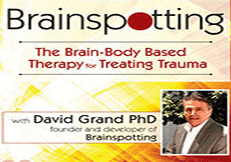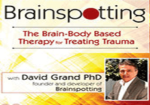There is a new brain-based relational treatment approach developed by David Grand, PhD. that will give you more effectiveness as a therapist and avoid poor client responses.
Â
David Grand – Brainspotting
Â
Here’s a typical scenario: at the end of the session, your client either responded well or not at all to treatment. And even those that responded well to treatment have often regressed by their next session. They’re angry – and you thought you had made a therapeutic gain.
If you’re like most therapists, you rely on talk therapy or a technical modality. What you are missing is the brain-body relation.
There is a new brain-based relational treatment approach developed by David Grand, PhD. that will give you more effectiveness as a therapist and avoid poor client responses.
Brainspotting is a powerful, focused treatment method that works by identifying, processing and releasing core neurophysiological sources of emotional/body pain, trauma, dissociation and a variety of challenging symptoms.
Trauma overwhelms the brain’s processing, leaving pieces of unprocessed experiences frozen in time. Brainspotting will provide you with powerful tools enabling your clients to quickly and effectively focus and process through the deep brain sources of many emotional, somatic and performance problems.
Where we look reveals critical information about what is going on in our brain. By carefully observing how and where clients look and focusing on the particular spot, this helps the client process disturbing material more gently and deeply.
Get immediately download David Grand – Brainspotting
Why is it better than many approaches?
Flexible
Bridges the gap between talk and technical modalities
No protocols to master (like EMDR)
Open and relational
Responsive to the needs of the client
Includes brain-body tools
Can be adapted into any clinical approach and therapeutic style
Handouts
Manual (6.73 MB) 51 Pages Available after Purchase
Outline
What is Brainspotting?
Brain-body based relational therapy
Deeper, more powerful processing of trauma
Brainspot – activity in the brain in response to focus and eye position
The Three Types of Brainspots
Outside Window: Client unaware of therapist tracking reflex brainspots
Inside Window: Client and therapist work together to find brainspots
Gazespotting: Client has a fixed gaze while thinking or speaking
Reflexive Responses in Clients
Eye wobbles
Eye freezes
Blinks
Facial tics
Brow furrowing
Sniffs
Swallows
Head nods
Body shifting
The Dual Attunement Frame
Interpersonal Neurobiology
Goal of brainspotting is accessing self-healing capacities
Activate, locate and process the sources of trauma and distress in the body
Unfreeze and release where the trauma is being held
Gain direct access to midbrain processes for bottom up brain-body change
Process
Activation
SUDS Level (10-0)
Location of activation in the body
Location of eye position of greatest activity
Focused Mindfulness (processing)
Get immediately download David Grand – Brainspotting
Faculty
David Grand, Ph.D.Related seminars and products: 10
David Grand, PhD, is a psychotherapist, writer, lecturer, performance coach, and humanitarian famous for the discovery and development of the internationally acclaimed Brainspotting method, which brings about life-changing breakthroughs at “Warp Speed.†Dr. Grand is a Licensed Clinical Social Worker with a PhD from International University, and is renowned for his groundbreaking discoveries and advancements in the arenas of healing trauma and enhancing performance and creativity. His Brainspotting method and BioLateral Sound are now used by thousands of therapist on every continent seeking to break through the limitations of talk therapy. Dr. Grand is the author of Brainspotting: The Revolutionary New Therapy for Rapid and Effective Change.
Speaker Disclosures:
Financial: David Grand maintains a private practice. He is the developer of the Brainspotting method. Dr. Grand receives a speaking honorarium from PESI, Inc.
Non-financial: David Grand has no relevant non-financial relationship to disclose.







